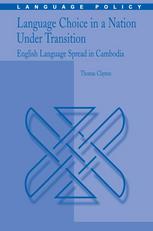

Most ebook files are in PDF format, so you can easily read them using various software such as Foxit Reader or directly on the Google Chrome browser.
Some ebook files are released by publishers in other formats such as .awz, .mobi, .epub, .fb2, etc. You may need to install specific software to read these formats on mobile/PC, such as Calibre.
Please read the tutorial at this link: https://ebookbell.com/faq
We offer FREE conversion to the popular formats you request; however, this may take some time. Therefore, right after payment, please email us, and we will try to provide the service as quickly as possible.
For some exceptional file formats or broken links (if any), please refrain from opening any disputes. Instead, email us first, and we will try to assist within a maximum of 6 hours.
EbookBell Team

4.4
52 reviewsThis book examines language choice in contemporary Cambodia, and uses the case study to explore and evaluate competing explanations for the spread of English globally.
Following the introduction, the multiple contexts in which Cambodians make individual and institutional language policy choices are considered. Chapters 2 and 3 examine the economic and political contexts for language choice, as Cambodia has transitioned from a planned economy and communism to a market economy and democracy. Chapters 4, 5, and 6 examine the assistance context for language choice; the bilateral, multilateral, and nongovernmental development agencies that have recently begun to work in Cambodia demand certain language skills of Cambodian employees and government counterparts, and support the learning of these languages in both nonformal and formal education.
Individual and institutional languages choices Cambodians are making in economic, political, assistance, and educational contexts are described. Some Cambodians have chosen to learn French, making language policy decisions supportive of French language learning, in anticipation of education offered in French at universities locally and abroad. More Cambodians are studying and learning Chinese to procure jobs with firms owned or managed by Chinese speakers. A great many have chosen to learn English and to support English language learning in education. These decisions respond to the multiple demands and opportunities for employment with economic and assistance enterprises associated with virtually every nation or group of nations, for regional and international political communication, and for education in the global infrastructure of English-language universities.
Having thus contextualized and described Cambodians’ contemporary language choices, the case study is applied to a theoretical debate in the field of language policy studies. The specifics of the Cambodian case fully confirm neither the "language choice" nor the "linguistic imperialism" explanation for the global spread of English. Rather, in Cambodia English is spreading as a result of both choice and promotion, it integrates with (though is not integral to) the contemporary global restructuring of the world, and has introduced results that, though aggregating toward amelioration, run the gamut from beneficial to exploitative for groups of Cambodians located variously along geographical, socioeconomic, ethnic, and other spectra.